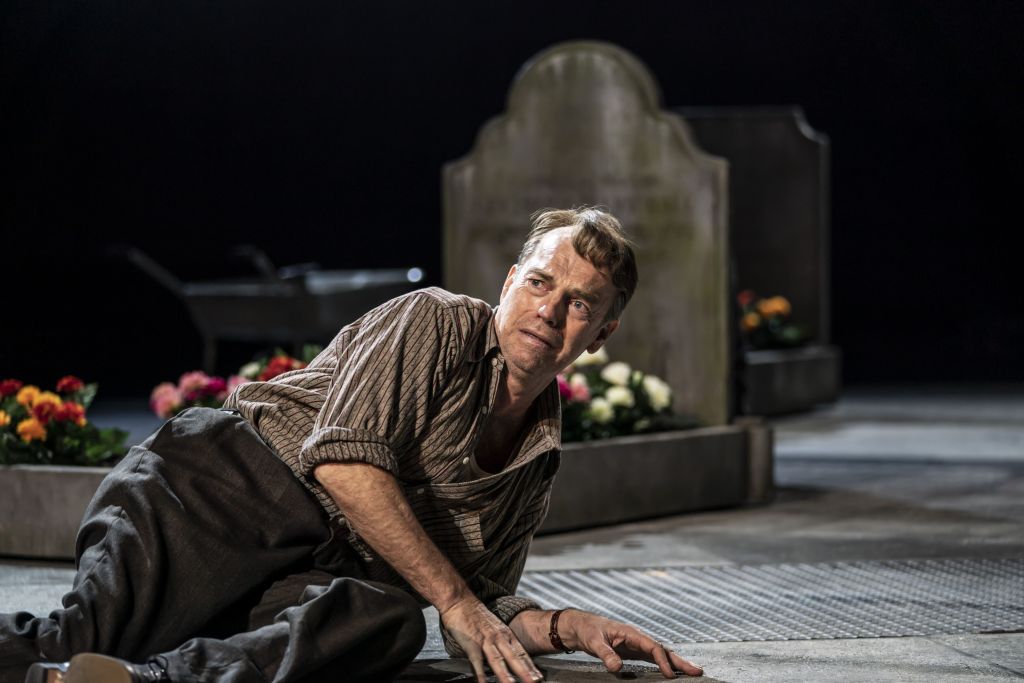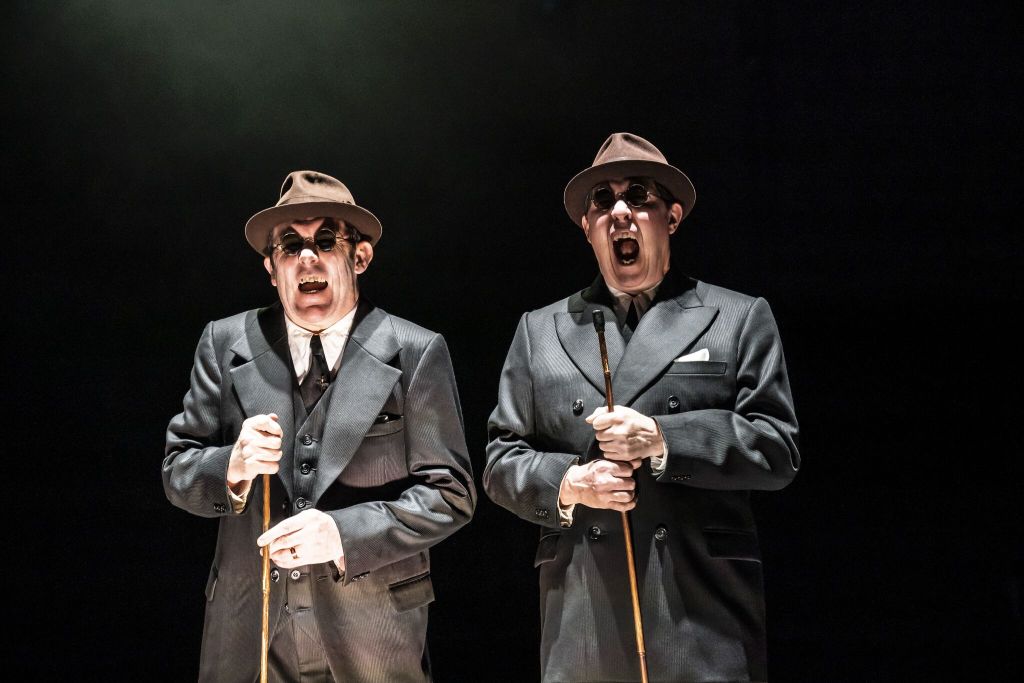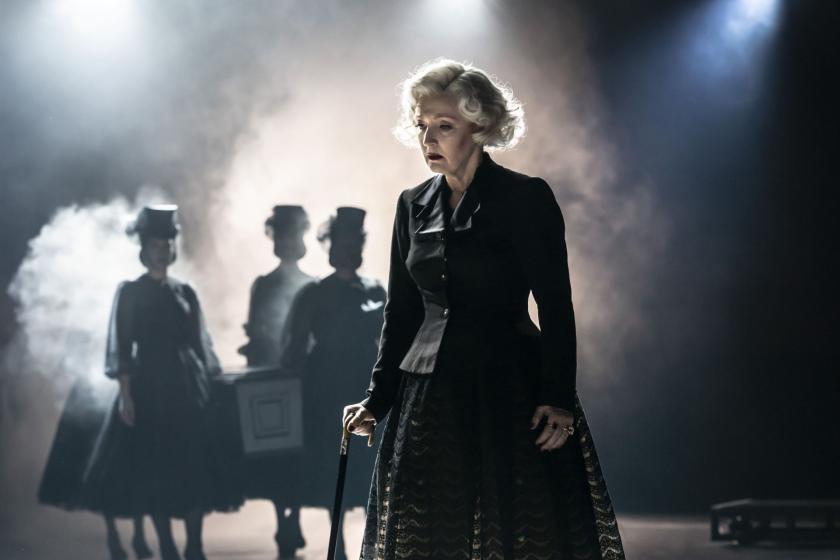Lesley Manville’s thrilling career ascent continues apace with The Visit, which marks American playwright Tony Kushner’s return to the National Theatre following the acclaimed Angels in America revival nearly three years ago. But Manville’s whiplash-smart assuredness in a role that calls for a star and gets one proves one of the few invigorating aspects of a long and spirit-depleting evening. Told across three acts (the second one only 40 minutes) with two intervals, the play fills the National’s largest stage with a huge cast, almost all of whom – Manville excepted – work hard to little result.
Adapting the iconic Friedrich Dürrenmatt play that over time has been an Ingrid Bergman-led film and a Broadway musical starring Chita Rivera, Kushner on paper is a perfect match for this material. Time and again, this most politically charged of dramatists has charted the damaging effects of money on both the psyche and society: not for nothing is his great musical, due to return to Broadway this spring, called Caroline, or Change. And money, lord knows, has an intoxicating effect on the town of Slurry, the New York State backwater on the shores of Lake Erie to which Kushner has relocated this story of revenge. In a faltering prelude to the main event that serves mostly to expose the cast’s seeming discomfort with the American accents, the town is in a tizzy over the imminent return home of the world’s richest woman. When Manville’s Claire Zachanassian does arrive, a panther and various supernumeraries in tow, two blind eunuchs among them, she promises the good (or maybe not) townsfolk one billion dollars on one condition: the death of Weaving’s Alfred Ill (pictured above), who spurned her when they were lovers back in their teens. “I own you all,” Manville snarls in her best Bette Davis fashion: “I dictate the terms.”
And money, lord knows, has an intoxicating effect on the town of Slurry, the New York State backwater on the shores of Lake Erie to which Kushner has relocated this story of revenge. In a faltering prelude to the main event that serves mostly to expose the cast’s seeming discomfort with the American accents, the town is in a tizzy over the imminent return home of the world’s richest woman. When Manville’s Claire Zachanassian does arrive, a panther and various supernumeraries in tow, two blind eunuchs among them, she promises the good (or maybe not) townsfolk one billion dollars on one condition: the death of Weaving’s Alfred Ill (pictured above), who spurned her when they were lovers back in their teens. “I own you all,” Manville snarls in her best Bette Davis fashion: “I dictate the terms.”
Pivoting about the stage on two metal legs that she likes to tap for emphasis, discarding husbands (eight and counting) like so many used tissues, this Claire cuts so immediately incisive a presence that Manville has the perverse effect of throwing into relief the bagginess surrounding her, not to mention a supporting cast still at odds with the accent and tempo of the play, not to mention their lines. (The volume of flubs suggests a production being cut and reshaped till the last minute.)
 You can sense Jeremy Herrin, the very able director, quite sensibly striving to balance the intimate and the epic in the second London opening in a row, following Leopoldstadt, to put to gratifyingly profligate use the acting talent in this town, but the result makes plain an ever-widening chasm between the prevailing hustle and bustle and the fact that, at its core, this Visit seems mostly to be running in place. You expect from Kushner the references to Marx, Thoreau, and Adam Smith that pepper the text, and Claire even gets an incongruously Prospero-like moment when she remarks that "every third thought shall be my grave". But I'm not sure we need an explication of the difference between the words emollient, emolument, and monumental – I don't know about you, but I tend not to confuse them – alongside an etymology of the Latin expression et cetera, not to mention more references to the Greeks than so essentially straightforward a parable can bear.
You can sense Jeremy Herrin, the very able director, quite sensibly striving to balance the intimate and the epic in the second London opening in a row, following Leopoldstadt, to put to gratifyingly profligate use the acting talent in this town, but the result makes plain an ever-widening chasm between the prevailing hustle and bustle and the fact that, at its core, this Visit seems mostly to be running in place. You expect from Kushner the references to Marx, Thoreau, and Adam Smith that pepper the text, and Claire even gets an incongruously Prospero-like moment when she remarks that "every third thought shall be my grave". But I'm not sure we need an explication of the difference between the words emollient, emolument, and monumental – I don't know about you, but I tend not to confuse them – alongside an etymology of the Latin expression et cetera, not to mention more references to the Greeks than so essentially straightforward a parable can bear.
Sure, a surfeit of language is a Kushner given and one can't readily imagine Angels or even a play like The Intelligent Homosexual's Guide ... (even the title of that one is prolix) having the same impact shorn of the words that have an oxygenating effect on characters who run towards, not away from, thought and debate. The difference here is the feeling that a tensile story entirely apposite to a climate in which money everywhere rules (think, for instance, of a possible Trump v Bloomberg presidential race) has been unnecessarily attenuated to amplify a narrative that long ago proved its staying power. You want more of the inherent camp of a piece that includes two blind eunuchs, Koby and Loby (pictured above), who look as if they might break into a vaudeville routine at any minute. The malicious fun of The Visit is part of its appeal, as Complicite announced for keeps in their defining production of the same story at this address nearly 30 years ago; an Olivier-winning Kathryn Hunter was the lead then.
The operatic overkill does allow for a display of the National's resources at full tilt. Vicki Mortimer’s full-throttle design allows a denuded forest to come whooshing into view thanks to the drum revolve of the Olivier stage, and Paule Constable’s fierce, unforgiving lighting illuminates a citizenry held to ransom by their more craven impulses. But I doubt I was alone in nodding with Sara Kestelman, on hand as a speechifying school principal, when she snaps late on, “I need a drink.”















Add comment